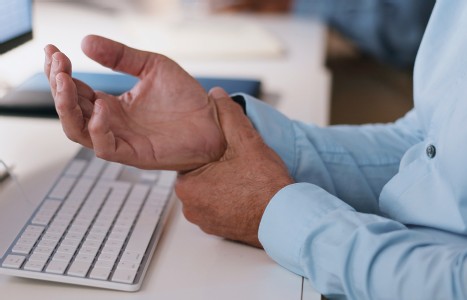When sports chiropractors first appeared at the Olympic Games in the 1980s, it was alongside individual athletes who had experienced the benefits of chiropractic care in their training and recovery processes at home. Fast forward to Paris 2024, where chiropractic care was available in the polyclinic for all athletes, and the attitude has now evolved to recognize that “every athlete deserves access to sports chiropractic."
Chiropractic Sports Medicine: Joints in Motion
I received this letter recently:
Dear Dr. Batchelor,I have developed a pain in my lower back and knee that won't go away. It is on the right side at the bottom of my spine. It occurred from working in the yard in late October. Now I am frustrated. I've rested, stopped running, stretched, etc., but the pain continues. I have recently begun to take painkillers to stop the pain. I know that they are not healthy, but I really need to run and taking the painkillers allow me to run. Now when I don't take the painkillers, the pain is worse. I have tried massage, physical therapy, and even acupuncture. Nothing has helped.
Recently, a friend of mine went to your clinic for a knee injury and she now runs pain free. I have not really thought about chiropractic until she mentioned it. Can it help me?
Elizabeth Carroll
Atlanta, Georgia
Dear Elizabeth,
Not long ago, I spoke to the "joints in motion" training team. Gary Jenkins was in charge, and he asked me if I would speak to the group on a running related topic. My first impression was that "joints in motion" was a dope-smoking club, but upon closer examination I realized that dope smokers probably couldn't run a marathon. In reality, the "joints in motion" team was training to run the Ireland Marathon and my speech was on "The Prevention and Rehabilitation of Running Related injuries."One member of the group told me that she had been running with a knee injury for a long time and that to allow her to run pain free, she would take painkillers to cover up her pain. She believed that this was the best avenue to follow. I told her that taking painkillers to allow pain free running is similar to driving down the road in your automobile, noticing that the oil light is beginning to flash and clipping the wire that controls the light. Eventually, damage results.
Taking a painkiller eliminates the monitoring system that tells you not to run. The body is so keenly intelligent that sometimes we take it for granted and expect it to function well even under extreme abuse and disregard for its intelligence.
The body is so intelligent that it will shut itself down when we neglect its warning signals. For instance, have you ever felt the burn and the fatigue associated with lactic acid production? If you push your body hard enough while running, its innate intelligence will dump lactic acid into your bloodstream and muscles. This lactic acid protects you from injuring your muscles. This muscular inhibiting effect is used to partially shut down the system to protect you from yourself. If you don't heed its warnings, then it will shut down your system completely. "Monkey on my back" is the common phrase used.
Now, back to your condition involving your back. Your pain is now worse because you have been masking it with the painkillers and continuing to run, etc. It is possible to do irreparable damage to your lower back and knee by taking painkillers and then running.
Painkillers have their time and place, as does the drugless profession of chiropractic. This is not the time or place for painkillers.
Back pain has a number of causes. Bending forward and lifting in the yard may have sprained the ligaments that hold your lower vertebra or pelvic bones together. Most lower back conditions develop from bending over to lift, which causes the joints in your lower back to be at their most unstable point. In this position, the joints are not locked into position tightly as when lifting with back straight and knees bent. The way to determine that nature of your condition and its correction is through proper examination.
Chiropractic helps many conditions. Many people seek out chiropractic first, as opposed to last as in your case. Most knee injuries occur from bending and twisting the knee at the same time. This is when the knee is also at its most unstable point. Ligaments, cartilage and other structures are torqued and twisted unnaturally.
I had a football player from the Atlanta Falcons in recently for a knee injury. He had bent and twisted the knee at the same time and injured the ligament and the meniscus (cartilage) on the inside of his knee.
Compared to the back, the knee is actually a very simple structure. There are certain positions and angles that it may be placed into which makes it very unstable and easily injured.
From the information you have given me, it is impossible to make an accurate diagnosis. On Tuesday nights at 8:00 p.m., I talk on knee injuries and back pain at the clinic and perform free examinations afterwards. Bring your back and knee in, and let's see if we can help them!
About the author:
Dr. Batchelor has been one of the top middle-distance runners in Atlanta since 1977. He has been a consultant for Runners World magazine, Running in Georgia, Running Journal, and Run and See Georgia.
Dr. Batchelor can be contacted by mail at: at 270 South Atlanta Street, Roswell, GA 30075; by phone at (770) 992-2002; or by e-mail at drbatch@aol.com.


